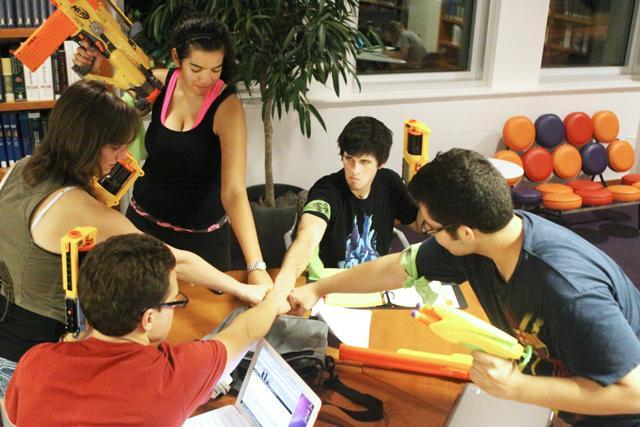
© NCSU Student Media 2011
Marissa Bloomfield, sophomore in psychology, and her fellow classmates have a squad meeting in D.H. Hill library after the Humans vs. Zombies kickoff on Monday night. Photo by Greg Wilson.
Zombie-themed movies, TV shows and now competitions between students have launched the undead into mainstream popularity—but some political scientists and policy makers have looked into the pop-culture epidemic with intrigue.
Daniel Drezner , political science professor from the University of Chicago and columnist of Foreign Policy, published Theories of International Politics and Zombies in light of the craze, which is not just a contemporary popular trend, but one that dates back to biblical times.
“There are many natural sources of fear in world politics,” Drezner wrote. “Terrorist attacks, lethal pandemics, natural disasters, climate change…[but] it is striking how an unnatural problem has become one of the fastest growing concerns in international relations. I speak, of course, of zombies.”
The infection of zombies on campus has brought the issue to attention. Currently, there is no public health recourse in the case of an undead epidemic.
According to Deborah Threadgill , assistant professor in microbiology and instructor of global public health courses, epidemics are managed from a local scale.
“The CDC, Center for Disease Control and Prevention, in Atlanta was tracking back during the H1N1 craze,” Threadgill said. “They were getting updates from locals. Each state was getting updates from state health labs.”
In the case of a zombie epidemic, public health lab and hospitals would update state centers on the outbreak, which would then forward the information to the CDC, according to Threadgill .
Once an infection, outbreak or pathogen on the loose is identified, the government and private sector then collaborate to create a vaccine.
“Usually, vaccines will go to the private sector,” Threadgill said. “Novartis is always involved with flu vaccines and jumped on the swine flu research quickly. CDC will see if a certain vaccine will work, but there are some companies that specialize in vaccine production. “
According to Threadgill , drug companies developed the H1N1 vaccine quickly, despite lab difficulties in culturing the virus. But vaccine production is not just about making money for Big Pharma , but is of tremendous public health consequence too, Threadgill said.
Threadgill said Dr. Robert Neville, the character of Will Smith in I am Legend, was a good example of an optimistic approach to curing a zombie attack.
Other popular movies tend to take violent approaches to the zombie solution, but in accordance to the Hippocratic Oath, doctors and public health officials must do no harm.
Quarantine is the next best option.
“Hospitals have a triage system in which people who need the most care get it first,” Threadgill said. “In the case of epidemics and hospitals are overwhelmed, there is home quarantine when there is no room in the hospital.”
But public health officials like to stop diseases before they spread, according to Threadgill . In the age of high-speed transportation, an illness like SARS or avian flu can spread across borders quickly.
“Global health focuses not on just studying epidemics but also halting the spread of them,” Threadgill said. “Policy can then work with medicine to isolate a disease to a contained space so others don’t get infected.”
When vaccines, antibiotics and quarantine don’t work, sometimes infected communities have to wait it out. It seems like N.C . State will have to wait it out until the end of this week.